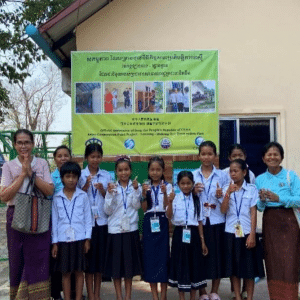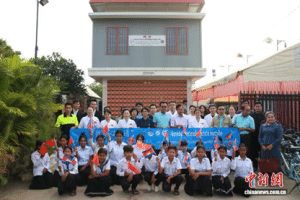2015 has been an important year for philanthropy in China. Some of the most important changes occurred in the field of legislation. Drafts of the long-awaited new Charity Law and of the Overseas NGOs Law were made available for public consultation. New laws on environmental protection and domestic violence were released, both of which are of close concern to NGOs. Another event which proved to be a milestone for the sector was the tragic earthquake in Nepal. This turned out to be the first time that different Chinese NGOs came together to provide aid to a foreign country struck by natural disaster.
Now that the year has come to a close, we have drawn up a list of the top ten news stories from the last twelve months for the benefit of our readers.
1. The implementation of the new environmental law
The revised Environmental Protection Law, passed on April 24, 2014 at the 8th meeting of the Standing Committee of the 12th National People’s Congress, came into force in 2015. According to the new law, Social Organizations (社会组织) may bring a public interest lawsuit if they meet the following conditions: being registered with a civil affairs bureau above the city (with district) level, being active for at least five years, and with no record of illegal activities.
Despite the positive message from the government, the responses from the public welfare sector were not as enthusiastic as people had expected. Only a few well-established environmental NGOs have attempted to file a lawsuit since the new law took effect mainly due to a lack of experienced legal staff and financial resources.
Related news:
Public interest lawsuits: spring for environmental protection
Environmental lawsuits still too expensive
Zhu Xiao: the compensation mechanism of environmental lawsuit to be perfected
More than 700 CSOs now able to bring environmental lawsuits
Zhou Qiang: threshold for environmental lawsuits will be lowered
Green NGOs win first lawsuit since the new environmental law took effect
2. The Nepalese Earthquake (Chinese NGOs going out)
The devastating earthquake that struck Nepal and Tibet on April 25th has prompted many Chinese NGOs to react swiftly and collectively in what could be the first large-scale cooperation between Chinese NGOs in international disaster relief. Problems have also been exposed in Chinese NGOs’ relief efforts, but overall the active participation and quick response of Chinese NGOs after the earthquake is a positive sign for the development of the Chinese civil society.
Related news:
The China NGO Consortium for the 2015 Nepal Earthquake
The Amity Foundation works through the ACT Alliance to launch disaster assessment in Nepal
The One Foundation’s first 72 hours in Nepal
Information sharing has helped Chinese NGOs work together in Nepal
Report on Chinese Nepal earthquake fundraising released by CCIC
First major cooperation between Chinese NGOs in international disaster relief
Survey shows almost 70% support Chinese NGO participation in international humanitarian relief
Are Chinese NGOs in Nepal “lonely islands”?
Four characteristics of China’s response to the Nepal earthquake
3. The draft overseas NGOs law
The second draft of the Overseas NGO Management Law of the People’s Republic of China, which was released online on the NPC website for public consultation from May 5 to June 4, received much attention from both the Chinese and the international civil society. Many experts pointed out that the draft, if passed, is not only going to have a big influence on overseas NGOs operating in China but also on the nation as a whole. But some were more cautious about their comments, saying they had to wait and see the final law and the implementation regulations to understand the impact of the law.
Related news:
Draft overseas NGO law released online for public consultation
Questionnaire about the draft Overseas NGO Management Law
China Philanthropy Times: the Overseas NGO Management Law affects more than just NGOs
Overseas NGO Management Law discussed at Shanghai seminar
Council on Foundations and ICNL hold conference call on overseas NGO law
Overseas NGO Management Law not included in latest deliberation of NPC Standing Committee
Minister of Public Security: overseas NGOs are welcome to operate in China
Sharp drop in NGO sponsorships from overseas
4. Registered NGOs to establish “Party groups (党组)”
On May 29th, the Political Bureau of CPC Central Committee passed the “The Communist Party of China’s Party Organizations’ Working Regulations (trial) (中国共产党党组工作条例(试行))”. The newly passed Regulations now states that a number of types of organizations – for the first time including registered NGOs (called “social organizations”, 社会组织)- are required to establish Party groups.
Related News:
Trial regulations require registered NGOs to establish “Party groups (党组)”
CCCPC releases opinion on Party-Building in “social organizations”
5. Left-behind children
On June 9th, four “left-behind children (留守儿童)” committed suicide in their home in Bijie, Guizhou Province. The tragic incident once again brought public attention to the problems facing China’s “left-behind children”. It also became the most discussed topic among Chinese NGOs at the time. Many academics, media professionals, and experts from NGOs that had been involved in solving problems facing left-behind children took part in the discussion. They were all seeking answers to the ultimate question: what can NGOs do to help China’s left-behind children.
Related News:
Solving the challenges facing ‘left-behind children’ requires efforts from everyone
Survey on the living conditions of China’s 61 million left-behind children
Road to School releases white paper on mental issues facing China’s left-behind children
NGOCN: what can Chinese NGOs do for left-behind children?
China Youth Daily: what can NGOs do for China’s left-behind children?
Yuan En Space Roundtable on China’s Left-Behind Children
Two left-behind children murdered in Bijie
Second public welfare summit on left-behind children held in Shenzhen
Trailer of a VR documentary on left-behind children released at Davos Forum
6. Online philanthropy
During 2015, NGOs around China have responded swiftly to the new trend of giving to charity over the internet. Numerous online platforms and philanthropic activities have been launched, stimulating innovative solutions to social problems
New spring festival donations trend: Hong Bao charity
Yu-e: the “one stop” online philanthropy platform
Recende releases “first” report on philanthropic crowd-funding in China
Tencent lauches China’s first Internet philanthropy day
Public opinion on providing platform services for social donations solicited
Hope Items, an online platform to make donations, starts up!
‘Internet and Philanthropy’ seminar held at CCF
7. The China Charity Fair
The 3-day China Charity Fair was held in Shenzhen from September 18th to 20th, co-hosted by CCF’s Organizing Committee, the All-China Federation of Industry and Commerce, and the China Charity Alliance. The focus was on the topics of internationalization and global communication
Related News:
Seminar held as the kick-off meeting of the 4th China Charity Fair
China Charity Fair launches the “Venture Philanthropy Partner Plan”
CDB will hold a special event at China Charity Fair
Latest updates on the upcoming China Charity Fair in Shenzhen
8. Draft charity law
The long-awaited Charity Law of the People’s Republic of China will be sent to the NPC after its recent second reading at the 18th Session of the 12th NPC Standing Committee in December 2015. The first draft was published online for public consultation in November 2015. The Charity Law has been in the pipeline since 2005, and most of China’s NGOs have been awaiting its release with some trepidation. The law has received divergent feedback from the charity sector, with many seeing it as an encouraging sign of progress, even though certain articles within it have produced much controversy and debate.
Related News:
Second draft of the Charity Law: no geographic limitations on online fundraising
US-China Charity Law Workshop held in Beijing
Draft Charity Law released online for public consultation
The NPC will review the Charity Law draft
China’s Long Road to the Charity Law
Charity law set to be reviewed by the NPC this year
9. NPC passes Anti-Domestic Violence Law
The People’s Republic of China Anti-Domestic Violence Law, the first law to address domestic violence in China, was released during the Eighteenth Session of the Twelfth Standing Committee of the NPC on December 27, 2015. This law will be enforced from March 1st, 2016. It contains a few notable points. It stipulates that psychological violence should also be seen as a kind of domestic violence. However, it does not cover sexual violence. The law also mandates that violence between “people living together”, even when they are not married (but excluding homosexual relationships), should be regarded as domestic violence.
Related News:
NPC passes Anti-Domestic Violence Law
New Domestic Violence Law draft sent to the NPC
Draft of Anti-Domestic Violence Law now available online for public consultation
New guidelines released on domestic violence
New anti-domestic violence legislation still conservative
10. CPFF annual meeting
The China Private Foundation Forum (CPFF), founded in 2008, held its 7th annual meeting in Shenzhen from November 30th to December 1st. The meeting focused on the development and fundamental role of frontline project officers from private foundations, and serves as a platform to welcome discussion and communication among domestic and international foundations, NGOs and other sectors.
Related News:
CPFF annual meeting ends successfully
CPFF annual meeting: cultivating talents



